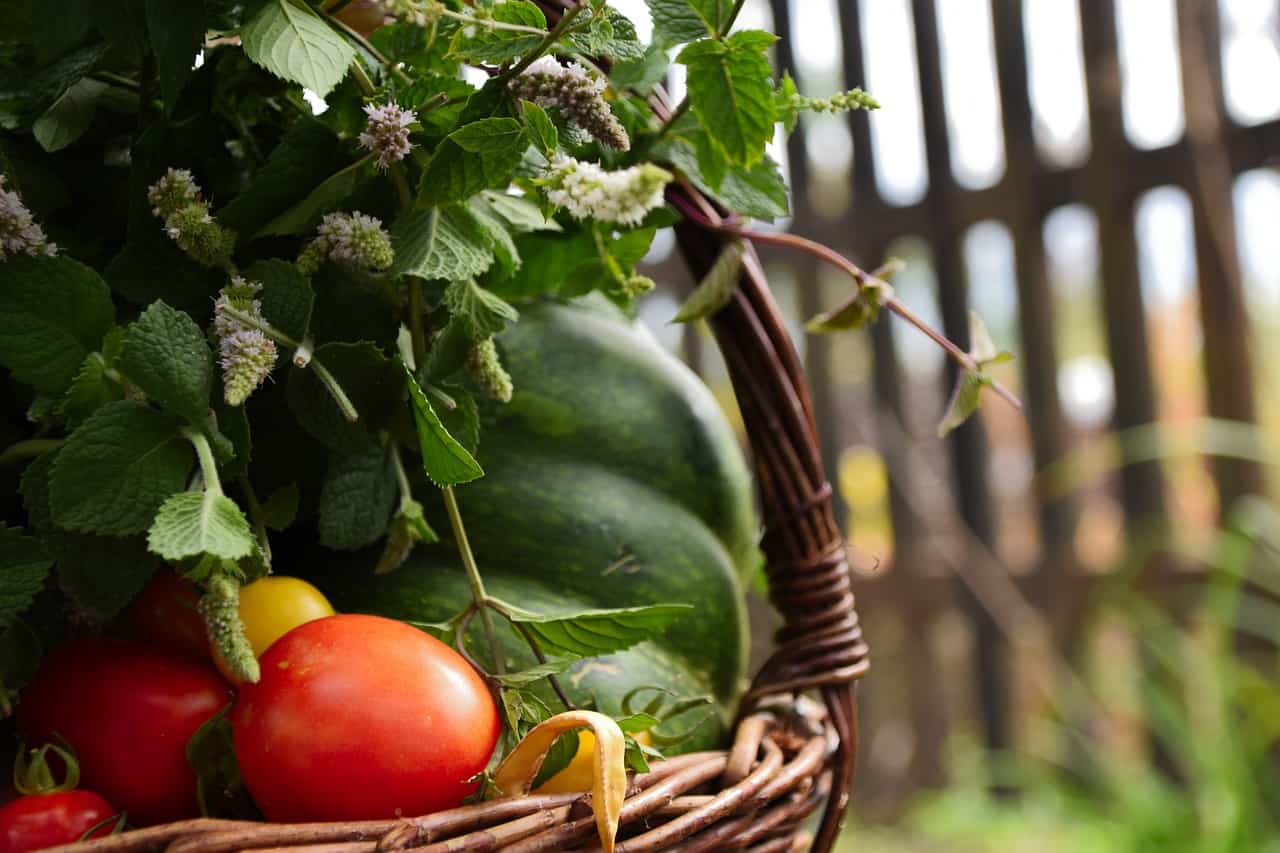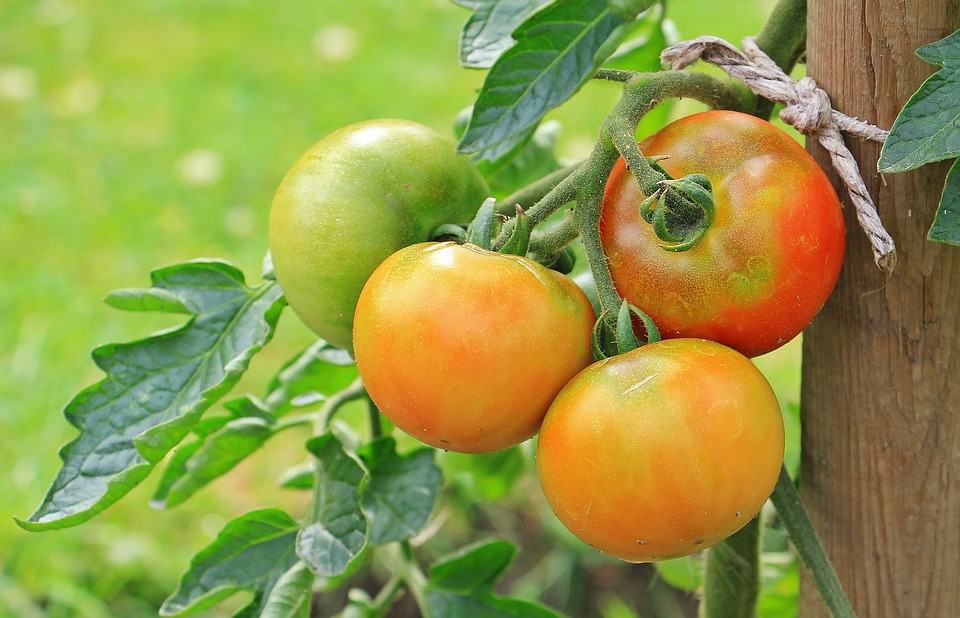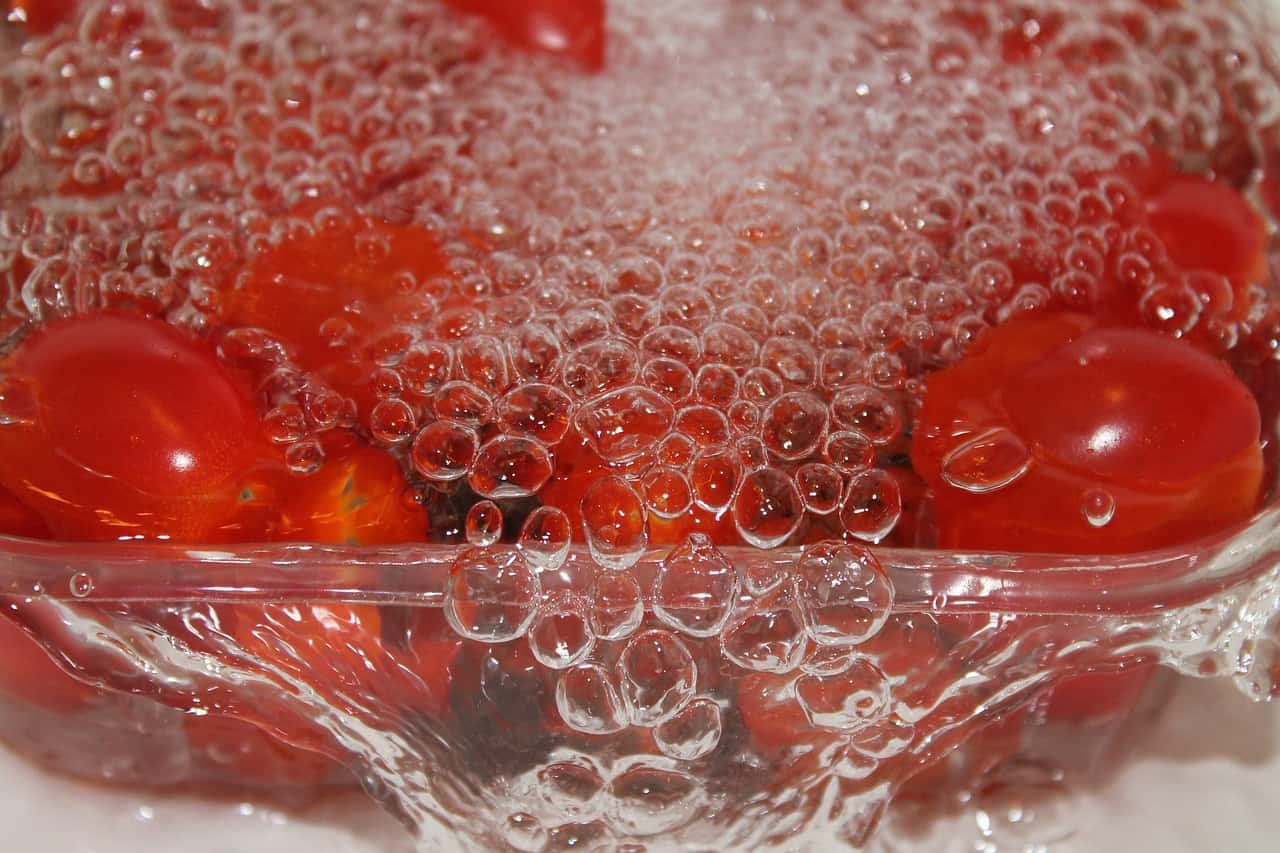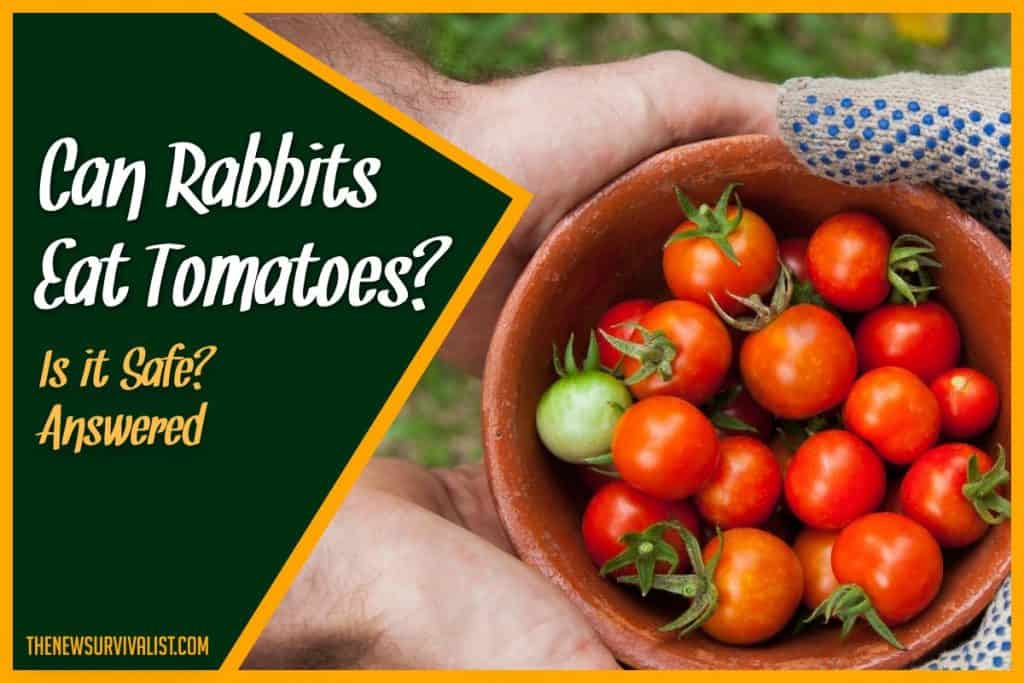Tomatoes are a pretty common food item to have on hand, being a component in everything from ketchup to pasta bases, salads, and even a few choice drinks. You’re bound to have a couple lying around, and if that’s not the case yet, getting your hands on them won’t be hard no matter where you are. Can rabbits eat tomatoes?
Yes, but only to a certain extent. Only the fruit part of the tomato is edible, and even then, you need to keep the quantity low due to sugar content. Tomatoes are rich in vitamins, water, and fiber, but also loaded with sugar rabbits aren’t equipped for. Deseed thoroughly – though it’s not an immediate health risk – and it’ll make a fine addition to their meal plans.
Tomatoes have a lot to offer rabbits, being one of the few that fall under the category of superfoods. They’re also a great source of vitamin A and C, as well as fiber, antioxidants, and minerals.
Can Rabbits Eat Tomatoes?
Tomato Health and Nutrition

Tomatoes are very healthy fruits and make for a nice and accessible addition to most diets. They’re primarily rich in vitamin C, potassium, and fiber.
Vitamin C
Regarding vitamin C, a single tomato can easily meet a third of an individual’s total daily needs. This, of course, can easily meet your rabbit’s own needs. Vitamin C heavily contributes to the immune system, boasting antioxidant properties that also combat cancer.
While cancer isn’t common in rabbits, anything that alleviates those symptoms also bolsters their general health to a notable extent. It’s also responsible for maintaining the tougher tissues in our bodies – mainly bone and cartilage.
It’s also naturally produced by rabbits. In fact, they actually need every vitamin EXCEPT C supplemented for them. Too much vitamin C can lead to kidney damage for the animals, and overfeeding them tomatoes will lead to a marked decline in their quality of life.
That detail is still heavily contested among professionals. Some argue that rabbits can’t even absorb vitamin C from their food, and evidence exists to support both sides of the argument. The one thing they do agree on is that dedicated vitamin C supplements are a no-go.
Make sure to keep yourself informed on new developments, but the current consensus on vitamin C doesn’t specifically single out tomatoes in their diets. In short, tomatoes should be fine, despite their vitamin C richness, provided that you carefully regulate their portion sizes.
Fiber
Rabbits require diets high in fiber to maintain their gut bacteria. They’re designed to accommodate meals low in both energy and protein, and the fiber content helps regulate their bodies to function optimally. It also helps regularize their bowel movements.
The absence of fiber in your rabbit’s diet comes with a lot of potential complications. One of the most common manifestations is marked obesity. This is due to them consuming more energized and calorie-loaded foods their bodies aren’t equipped for. Obesity leads to added strain on their already fragile bodies, which could strain their organs and even skeletal structure in extreme cases.
A more immediate risk would be the dreaded GI stasis. It’s a dangerous risk that comes with low fiber diets, leading to bloating, loss of appetite, and eventual death. Ensuring they meet all their fiber needs by feeding them fiber-rich food such as tomatoes and celery greatly lowers the possibility of GI stasis developing.
Beta-carotene (Vitamin A)
Tomatoes are a great source of beta-carotene, which effectively gets converted into vitamin A within the body. This can be found in the reddish pigment on the fruit’s skin.
Beta-carotene – and by extension vitamin A – maintains mucus membranes, skin, and other soft tissue. Rabbits, in particular, are susceptible to snuffles, which gives them breathing difficulties that are tricky to treat at home.
It also contributes to better vision. This is actually where the myth that carrots improve eyesight stems from. The difference won’t be as marked as most people desire, but beta-carotene does help maintain one’s vision. This is a welcome addition to animals that depend on their sight like rabbits.
Vitamin E
Rabbits are usually prone to vitamin E deficiency given that they can’t produce it naturally, unlike vitamin C or K. Vitamin E has fortifying properties and is a crucial component of their growth. It also boasts antioxidant properties like vitamin A and C.
It’s a specific addition needed in domesticated animals that helps them maintain cell structure integrity. Most animals aren’t built to handle domesticated living, and vitamin E is responsible for an improved quality of living for them under such conditions.
Do Rabbits Enjoy Eating Tomato?

Rabbits absolutely adore chomping down on tomatoes! They make for nice, sweet treats. You can even serve them chilled – perfect for them on a hot summer’s day.
Tomatoes are part of the nightshade family. Most of these are edible but contain alkaloids that can poison people when prepared improperly. The fruits are pretty much the only edible part of the plant. Even then, they need to be a deep, flushed red to be fit for feeding.
Green tomatoes are not only extremely sour but rich in solanine, which is a toxic substance most small animals (link to chicken and tomato article) can’t tolerate.
Rabbits are communal animals and usually get along during feeding time. Communal troughs shouldn’t be problematic for treats, though it might be worth serving them individually just to make sure no one is overindulging.
Older rabbits usually know better on this account. The younger bunnies will gorge themselves to the point of bloating. Don’t give any tomatoes to bunnies younger than three months old, and even then, introduce the treat into their diets gradually.
How Many Tomatoes Should You Give Them? How Often?
Limit it to a few instances a week in very small portions. A cup’s worth of tomato for a week would already be too much for them. Make sure the bits you give them are bright red and have been thoroughly deseeded. About a quarter of a tomato per rabbit is a safe number, and the quantity goes up with their weight.
You don’t want your rabbits expecting the treat, as they can end up neglecting their own dietary needs in favor of filling themselves up on sweets. Try to rotate their meal plan – celery (link celery and rabbit here) makes for a great choice in lieu of tomato, and its low glycemic index score makes it ideal for maintaining their sensitive gut bacteria cultures.
This only extends to older bunnies, though. Any rabbits below three months old shouldn’t be fed treats, period. It upsets their stomach pretty potently, and it’s tedious to treat at such an early stage of their life.
Unlike rabbits’ normal feed, it’s important to remove leftover tomatoes promptly. It’s liable to rot or grow mold and will do so at a much quicker rate than their normal hay. It’s also for this reason that you want to serve tomatoes separately from their main feeder. Try to sort out leftovers by at least the end of the day.
A Question of Ripeness

Most animals can only eat red tomatoes. The green ones contain solanine, which adversely affects general health. Solanine poisoning can even occur in humans, so don’t underestimate the potency of a single fruit.
Younger tomatoes possess much more solanine than their older counterparts. Avoid feeding them any tomatoes that still have a hint of green to them.
If you want your tomatoes to ripen faster, simply leave them on a countertop. Do not try to induce ripening. You’re more likely to develop mold cultures on the fruit itself. Simply wait around two to three days or until the tomato has developed into the right color for feeding.
Failing to do so will cause your bunnies digestive issues, nausea, depression, or abdominal pain. Rabbits can’t vomit, so any poisoning in their bodies can’t be purged without veterinarian aid or activated charcoal. Steer clear of this possibility as much as possible by waiting for your tomatoes to ripen properly.
Proper Storage and Preparation
Storage
Tomatoes can keep on the counter without refrigeration. They usually last for a week there and double that when stored in areas like root cellars, coolers, or other cold storage options.
Don’t tuck them away in a freezer, though: they’ll come out mushy and dampen their flavor a bit. That’s perfectly fine for cooking, but your rabbits will need something a bit fresher for their tastes.
Buying them unripe isn’t too problematic. Just leave them out somewhere open, and the tomatoes will grow into their desired color. It shouldn’t take too long – no more than a couple of days.

Blanching is also an option for longer storage plans like freezing. The scalding process halts enzyme actions and mitigates flavor and nutrition loss. You can probably get away with two weeks in the freezer, provided you blanch your tomatoes properly. Keep the blanching brief, as their bodies still can’t handle cooked food well.
We still strongly advise that you stick to fridges and countertops, though. Try to serve tomatoes within three days of purchase. Their nutrition and aroma will fade a bit after that point has passed.
Preparation
First, start by cleaning your tomato thoroughly. A warm water bath can deal with superficial contamination very easily, though try to add some sort of cleansing agents like soap, salt, or even vinegar. Apple cider vinegar, in particular, makes a nice choice, as it’s also a nice rabbit supplement on its own.
Do not give them whole tomatoes. Both the stems and seeds are poisonous for rabbits. Slice through and deseed the tomato fruit as cleanly as possible. Rinse under cold water to avoid softening the fruit too much. Stronger water pressure helps dislodge stubborn seeds, so feel free to turn up the flow and save yourself some effort.
If you’re really strapped for time, you don’t have to be extremely thorough with the deseeding process. Tomato seeds to rabbits are what apple seeds are to us – harmful, but not immediately so, and it doesn’t accumulate in the body. Any errant seeds will pass through their body within a day’s time. Just don’t make a habit of allowing that situation to come up frequently.
Common Concerns
A minor concern is the possibility of lectins, which bind to digestive system walls and cause pain. Lectins resist digestive processes and can permeate sensitive gut cultures. Most nightshade family members – including tomatoes – contain these anti-proteins.
Lectins thankfully aren’t too prevalent a concern in rabbits. Most manifestations in rabbits usually take the form of arthritis, which is a long-term concern that could have any number of factors contributing.
It’s not an urgent risk for the rabbit’s immediate wellbeing, and if you’re raising them for meat it ends up even less problematic. Lectins are broken down in the cooking process and pose no danger after that point for human consumption.
Make sure to avoid feeding young bunnies treats. Introduce your tomatoes gradually once they’re past three months old. Not doing so will mess up their stomachs, and it’ll be difficult to handle their gut bloating and general distress without dedicated medical care or copious personal experience.
The sugar content in tomatoes can also be harmful in larger quantities. Keep the serving portions moderate, and scale it to their weight. Don’t go beyond a third of the fruit for a week, and that schedule should be safe for them.
In extreme cases, field mice and other pests will sneak into your rabbit’s homes and wreak havoc. Keep their general area free of food scraps and this issue shouldn’t be too prevalent.
Final Thoughts
Rabbits love tomatoes, and it makes a good addition to their diet. Mind the sugar content, seeds, and ripeness to avoid the worst complications from the treat. Tomatoes are a fine addition, but never serve them to your rabbits cooked.

